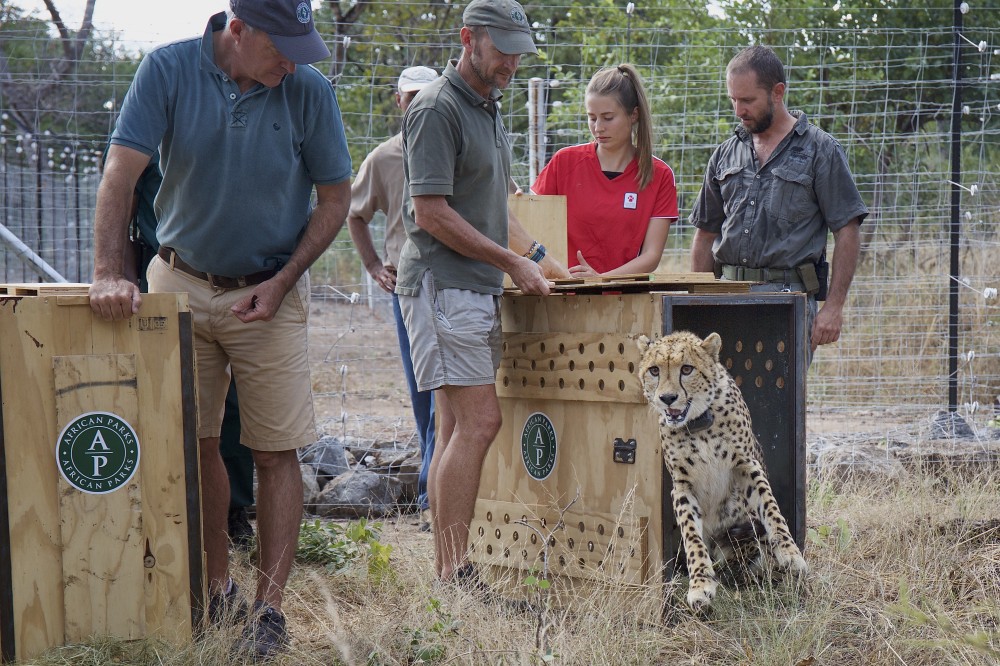 © Frank Weitzer
© Frank WeitzerCheetahs were translocated from South Africa to Liwonde National Park in Malawi, returning the threatened species to the country.
Blantyre, Malawi: A small founder population of cheetahs has been successfully relocated to Liwonde National Park in Malawi, restoring the severely threatened species at least twenty years after its extinction in the country. Led by African Parks, a conservation non-profit that manages national parks and protected areas on behalf of governments across the continent, in partnership with the Endangered Wildlife Trust (EWT) and Malawi’s Department of National Parks and Wildlife (DNPW), the translocation of four cheetahs to Liwonde on May 17th formed a national milestone as the first big cats made their return to the flourishing park.
Although 20 years since occurring in Malawi, it has been close to a century since cheetahs were documented in Liwonde National Park. Lions and leopards were also historically common, but disappeared in recent years due to rampant poaching. Decades of habitat loss, human-wildlife conflict and poaching severely reduced the nation’s predator populations, entirely eradicating cheetahs, a species threatened with extinction in Africa. “Large predators like cheetahs play pivotal roles in African ecosystems, but they are in troubling decline across the continent” said Liwonde National Park Manager Craig Reid. “Malawi has made progressive commitments to conserve wildlife. The reintroduction of the cheetah is historic for the country and a new era for the park, where the return of large predators holds great optimism for the restoration of the natural system and the conservation of this highly vulnerable species”.
On May 17th, African Parks and the Endangered Wildlife Trust oversaw the successful translocation of four cheetahs, which made the journey by plane from South Africa and arrived safely in Liwonde National Park, thanks to the support provided by Ulendo Airlink and Robin Pope Safaris for the transportation. They were released into specially-built bomas to allow for close supervision during a period of adjustment, until being released into the wider park. The animals are all in good health and are expected to do well in Liwonde, where habitat and prey conditions are optimal and measures are in place to ensure their ongoing conservation and protection.
These cheetahs were carefully sourced through EWT’s Cheetah Metapopulation Project, which was established in 2011 with the aim of creating safe spaces for cheetahs in South Africa and managing the existing population in a number of reserves to ensure genetic diversity. The project now operates in 54 reserves, and in 2016, began investigating opportunities for reintroduction outside of South Africa. This partnership was deemed ideal, as African Parks has secured safe spaces for a myriad of species in the reserves it manages. Phinda and Welgevonden Private Game Reserves made a male cheetah available, while Mountain Zebra National Park and Amakhala Private Game Reserve made a female cheetah available for this reintroduction into Malawi. These are considered to be some of the top cheetah reserves in South Africa, all having contributed substantially to cheetah conservation efforts in the country.
African Parks assumed management of Liwonde National Park in partnership with the DNPW in 2015, and since then has completely overhauled law enforcement to secure the park, making significant progress in revitalising habitat and wildlife populations through the reduction of poaching and mitigating human-wildlife conflict. The reintroduction of the cheetah forms part of the collective vision of African Parks and the Malawian government to restore the country’s parks, rehabilitate wildlife populations, and increase tourism, creating highly-valued assets for the country and its people. Managing and restoring key species also positions Liwonde as a globally significant wildlife tourism destination, with benefits flowing to local communities.
Eradicated from 90 percent of their historical range in Africa, cheetahs are listed as Vulnerable with as few as 6,700 estimated to remain in the wild. “Reintroduction to safe and fenced protected areas is one way to protect the future of the species on the continent” said EWT Cheetah Metapopulation Coordinator, Vincent van der Merwe. “This collaborative undertaking represents a highly valuable opportunity for both the park and cheetah conservation in light of the need for urgent action to address their decline”. Since assuming management of Liwonde, African Parks has constructed a reliable perimeter fence, removed thousands of snare traps, significantly reduced poaching, and is working with local communities to ensure the long-term success of conservation in the area.
The reintroduction of cheetahs to Liwonde National Park is another extraordinary story of progressive and optimistic wildlife conservation in Malawi. On the heels of the historic “500 Elephants” initiative which will see 500 elephants being moved from Liwonde National Park and Majete Wildlife Reserve to Nkhotakota Wildlife Reserve (all three parks are managed by African Parks with DNPW), the cheetah’s homecoming marks the historic return of the threatened species to the nation at least 20 years after its local extinction. This opens a hopeful new chapter for large predator conservation in the park. Liwonde has welcomed back its first big cat, a profound milestone for the ongoing restoration of this valuable protected area.